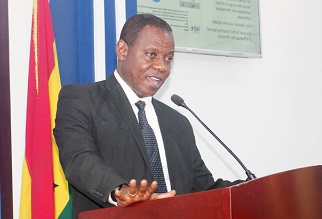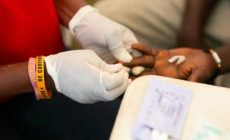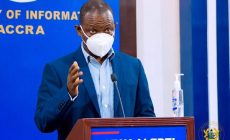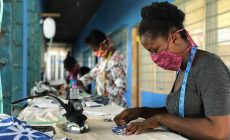Go for jabs, boosters to avert another wave – GHS to public
- Posted on
- Comment

The Ghana Health Service (GHS) has appealed to all eligible persons to go for their COVID-19 booster doses in the wake of rising active cases to help avert a fifth wave.
The service also called on all eligible persons who were yet to get a jab to do so immediately because the current increasing trend posed a risk for a major COVID-19 wave.
Active cases that reduced to 20 a couple of months ago rose to 1,064 by June 13, 1,255 as of June 21 and 1,417 as of June 22, 2022, with 14 severe cases and three critical cases.
Cases of monkeypox have also risen from five a couple of weeks ago to 18, with the last case confirmed on June 14, this year.
However, the GHS said it was in full control of the situation and asked the public to play its role by protecting themselves with face masks and observing all COVID-19 safety protocols.
Boosters critical
At a press briefing in Accra last Wednesday, to update the public on the public health outbreaks in the country, the Director-General of the GHS, Dr Patrick Kuma-Aboagye, said boosters had become critical in abating any further escalation of COVID-19 cases because after a period of being fully vaccinated, the anti-bodies in the vaccine began to decline resulting in reduced immunity.
“From three months after being fully vaccinated, an individual is eligible to take the booster dose,” he said.
“There is an increasing number of COVID-19 cases across the country which increases the country’s risk of a major wave of COVID-19 infections if the trend continues,” he said.
“Workplace and schools outbreak continue to fuel the rise. Greater Accra is the hotspot with over 70 per cent of all cases but is also less vulnerable to critical, severe illness and death due to its highly vaccinated population rate,” Dr Kuma-Aboagye said.
Hesitancy
The GHS Director-General said although public education on how vaccine safety and efficacy would help to break the transmission and mutations had been heightened nationwide, vaccine hesitancy remained a major challenge to the vaccination drive.
Dr Kuma-Aboagye attributed that to misinformation and low risk perception, concerns on efficacy and safety; mistrust of government and pharmaceutical companies; political and religious beliefs among others.
“Some people are also refused to take the vaccines because their districts were recording low cases but the unfortunate thing is that, they will be most vulnerable to severe, critical case and death in the event of any escalation or another wave,” he said.
On efficacy and safety, Dr Kuma-Aboagye reiterated the assurance that all local due diligence were done to ensure the vaccines deployed locally were very safe, noting that no adverse reactions of public health concerns had been recorded.
He said the country had more than enough vaccines to cover those yet to take a jab, as well as those eligible for booster doses.
“In all, the country has taken delivery of 32,836,648 doses of COVID-19 vaccines and 16,752,032 have been administered,” Dr Kuma-Aboagye said.
Why the Surge
The GHS director-general attributed the ongoing surge of COVID-19 cases to the increase in two sub-lineage Omicron variants known as BA4 and BA5; poor adherence to safety protocols, especially the wearing of face masks indoors and other high-risk spaces; vaccine hesitancy and poor booster uptake, among others.
“The President in easing the COVID-19 restriction to say face mask-wearing was not mandatory did not mean they were no longer necessary or we should not wear. All it means is that we should be responsible enough to do the right thing without the threat of prosecution,” Dr Kuma-Aboagye said.
He said based on public education, people should now see the value in wearing face masks and comply, describing that as a more sustainable approach than making it mandatory.
He encouraged corporate and educational institutions to encourage their employees and visitors to wear their face masks while on their premises, saying it was critical because workplace and school outbreaks were driving the current surge.
Monkeypox
On Monkeypox, Dr Kuma-Aboagye said cases were among people aged between nine months and 41 in four regions, the Greater Accra, Ashanti, Bono and Eastern.
“So far, no deaths from monkeypox has been recorded,” he said.
-Graphic










 (Selorm) |
(Selorm) |  (Nana Kwesi)
(Nana Kwesi)